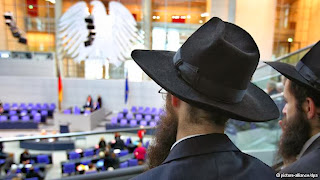A year ago after a long and difficult debate, Germany passed a controversial new rule circumcision. Now the critics calling the rule does not guarantee the welfare of a child.
Köln court decision set in spring 2012 sparked heated debate concerning Muslim and Jewish ritual circumcision . The court ruled that non - medical circumcision is harmful to the body
. Both
supporters and critics of non - medical practice long discussion on
television and the editorial page , offered medical and ethical
arguments . The
main question remains : how to reconcile freedom of religion and the
right of parents to choose how to raise a child on the one hand , with
the welfare of the children on the other side .
A law intended to answer that question . 1631d
paragraphs from the book of civil law states that circumcision is legal
and the boy should be done as per the rules of the medical profession '
- as safe as possible and with effective pain relievers . Parents
should be informed of the risk of the procedure , should not jeopardize
the well-being of the child , and request that the child is old enough
to be considered . Representatives from the Muslim and Jewish communities in Germany said he was satisfied with the terms specified .
How well it is ' normal ' ?
Minister
of Justice at that time , Sabine Leutheusser - Schnarrenberger , who
filed the legislation , said the new rules replace what is referred to
as the status quo before the court ruling Köln .
But
a year after effect, this law failed miserably - at least according to
the critics , who say circumcision is a violation of the physical
integrity of the child . They added , boys do not often pass through a safe procedure .
"
Rules legalize child foreskin amputation way questionable , " said
Christian Bahls , chairman of the association Mogis , who campaigned for
the physical integrity of the child .
Unhygienic procedures
Bahls
refers to a case in Berlin that launched the Jewish method , Metzitzah
B'Peh - where pengkhitan suck circumcision wound using a mouth , and not
a small dropper or tube . Because
the risk of infection , the Association of Children's Outpatient Israel
( IAPA ) , as well as other associations , have banned the practice.
Mogis demanded the baby boy 's father , a rabbi , as well as his grandfather, who was holding the baby while the circumcision . But
the case can not be canceled because there is evidence of a crime, and
the pengkhitan living outside Germany that are outside the jurisdiction .
Bahls assess this incident as evidence that the new rules do not protect the welfare of children . He
claimed prosecutors dismiss the case on the grounds that the use of
anti-pain after circumcision bandage is enough medical terms . "It is clear that amputating foreskin of a child without adequate anesthesia was permitted , " said Bahls . " It is permitted by law . "
Wolfgang
Gahr , secretary general medical academy for children and adolescents (
DAKJ ) , also heard reports of circumcision launched in less hygienic
conditions and without anesthetic . "These individual cases , " he said . " We do not have the exact figure . " DAKJ
against non - medical circumcision in general , but if it is inevitable
, " at least should take place under medical supervision and free of
pain . "
However,
both these conditions are not clearly defined by law , which states
that children under the age of 6 months can be circumcised by a person
appointed by the religious community - in other words , a pengkhitan ,
which is often not a doctor . This means he is not eligible to give anesthesia , says Gahr .
obligations ignored
Ministry
of Justice , on the other hand , citing what it claimed as evidence
that laws protecting the welfare of children - for example, the decision
by the German Supreme Court in September of 2013, which prohibits a
Kenyan woman to circumcise his son who was 6 years old because neither
the parents nor the doctors have not been consulted with the children , and because the parents do not understand well the procedure will be skipped .
German
Constitutional Court must also enforce the rules , when a man demands
after circumcision cast by someone who has never passed his medical
training , in 1991 , when he was 6 years old . The judge dissolved the case because when the new rule is not applicable . In other words , the court avoids the application of the new rule itself.
Wednesday, 25 December 2013
Subscribe to:
Post Comments (Atom)











0 komentar:
Post a Comment